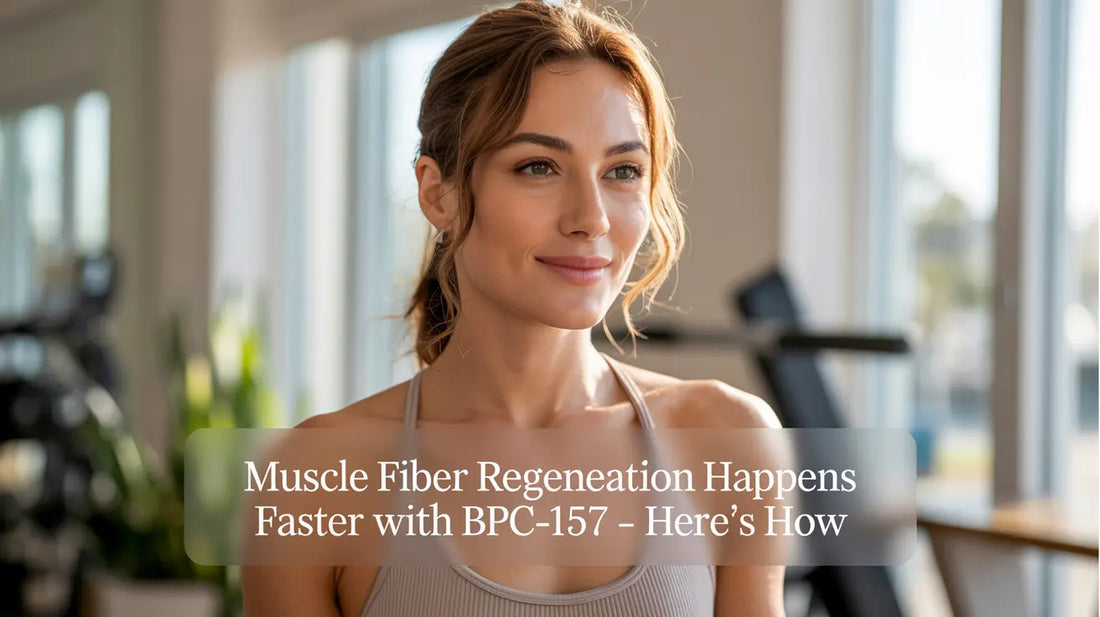
Muscle Fiber Regeneration Happens Faster with BPC-157 - Here’s How
Share
BPC-157 directly accelerates muscle repair by activating satellite cells, boosting blood flow, and organizing collagen scaffolds for rapid recovery.
In this article, you’ll learn:
- Key Actions: How BPC-157 triggers muscle regeneration
- Primary Benefits: What improved repair looks like
- Practical Protocol: Simple dosing and timing tips
- Safety Measures: Managing common side effects
- Integration Strategies: Pairing therapy with training and nutrition
How BPC-157 Triggers Muscle Regeneration
BPC-157 sets off multiple coordinated pathways to ensure swift, thorough muscle healing:
- Satellite Cell Activation: Enhances MyoD and Myf5 to awaken dormant muscle stem cells, accelerating their division and fusion with injured fibers.
- Angiogenesis Boost: Stimulates VEGF pathways to form new capillaries, improving oxygen and nutrient delivery and accelerating debris clearance.
- Inflammation Balance: Reduces excess TNF‑α and IL‑6 while preserving essential cleanup signals, preventing secondary damage from prolonged swelling.
- Collagen Organization: Guides fibroblasts to deposit structured collagen and proteoglycans, creating a resilient scaffold that mirrors native tissue architecture.
- Extracellular Matrix Support: Promotes balanced synthesis of proteoglycans and hyaluronic acid, maintaining hydration and shock absorption in the repair zone.
- Redox Protection: Upregulates antioxidant enzymes like superoxide dismutase, reducing oxidative stress on nascent collagen fibers and ensuring long-term stability.
Learn more in our main guide: Peptide Therapy for Tissue Repair
Primary Benefits of Enhanced Repair
Faster, stronger, and more durable healing outcomes:

- Reduced Downtime: Resume workouts up to 30% sooner with less soreness, allowing for more consistent training schedules.
- Improved Strength: Organized collagen scaffolds increase tensile capacity, boosting overall muscle power and endurance.
- Enhanced Flexibility: Restored elasticity in tendons and ligaments supports a full range of motion, reducing stiffness during physical activity.
- Scar Minimization: Controlled matrix remodeling limits rigidity and fibrosis, leading to smoother, more functional tissue.
- Accelerated Nutrient Delivery: Improved microcirculation ensures that essential amino acids and repair factors reach tissues more efficiently.
- Reduced Inflammatory Residue: Balanced cytokine levels help clear cellular debris and minimize lingering inflammation.
- Long-Term Resilience: Stronger collagen networks enhance resistance to future strains, supporting injury prevention and structural integrity.
Practical Dosing & Timing Tips
Follow these guidelines for consistent peptide levels:
- Dose: Place one sublingual strip of BPC-157 twice daily.
- Timing: Use 15–30 minutes after meals; allow full dissolution without chewing.
- Cycle: 6–8 weeks on, followed by a 4-week break to maintain receptor sensitivity.
- Hydration: Drink 8–10 oz of water post-dose to aid absorption.
InStrips Restore Instructions
Acute Phase (Injury/Recovery Support):
- Take one strip in the morning and one strip before bed.
- Place the strip on top of your tongue, then press it gently against the roof of your mouth until fully dissolved.
Maintenance Phase (Ongoing Support):
- Once improvement is noticed, reduce to one strip daily before bed.
- Follow the same application method: on the tongue, pressed to the roof of the mouth.
General Notes:
- Allow the strip to dissolve completely; do not chew or swallow immediately.
- For best results, avoid eating or drinking for 5–10 minutes after use.
Safety Measures
Minimize mild reactions for a comfortable experience:
- Gum Sensation: Mild tingling is normal—taking after a light snack can help.
- Digestive Comfort: Occasional nausea may occur if taken on an empty stomach; pairing with water or a small meal reduces risk.
Integration Strategies
To maximize recovery, integrate peptide therapy into a holistic regimen that blends targeted exercise, nutrition, and supportive habits:
Training Synchronization:
- Apply BPC-157 strips before and after resistance workouts to match the peptide’s peak activity window with muscle stress.
- Begin with low-to-moderate intensity sessions during early repair phases, then progressively increase weight and volume as tissue strength returns.
- Incorporate active recovery days—light stretching, foam rolling, or low-impact cardio—to maintain blood flow and support ongoing collagen remodeling.
Nutritional Foundation:
- Prioritize high-quality protein sources rich in leucine (e.g., whey, poultry, lean beef) to fuel satellite cell proliferation and collagen synthesis.
- Include vitamin C–packed fruits and vegetables (e.g., citrus, bell peppers, broccoli) to aid enzymatic cross-linking of collagen fibers.
- Add omega‑3 fatty acids from fish oil or flaxseed to temper inflammation and promote membrane fluidity in regenerating cells.
- Stay hydrated with water and electrolyte-rich beverages to support nutrient transport and cellular function.
Rest & Recovery Practices:
- Ensure 7–9 hours of quality sleep each night—growth hormone surges during deep sleep enhance peptide-driven repair.
- Use modalities such as contrast baths, compression garments, or gentle massage to optimize circulation and reduce swelling.
Lifestyle Habits:
- Manage stress with mindfulness techniques, since elevated cortisol can hinder collagen formation and prolong inflammation.
- Maintain a balanced micronutrient intake (magnesium, zinc, vitamin D) to support enzyme functions essential for tissue remodeling.
Frequently Asked Questions
Here are some questions and answers:
How quickly will I see improvements?
Most users notice reduced muscle soreness within 5–7 days; strength and flexibility gains often appear by week 2.
Can I combine BPC-157 with TB-500?
Yes. BPC-157 excels at early repair steps, while TB-500 aids later matrix remodeling. Stacking can enhance overall outcomes.
Is BPC-157 safe for long-term use?
Cycling (6–8 weeks on, 4 weeks off) helps prevent desensitization. Mild side effects are rare and typically transient.
For personalized guidance and advanced protocols, explore our Resource Library.
